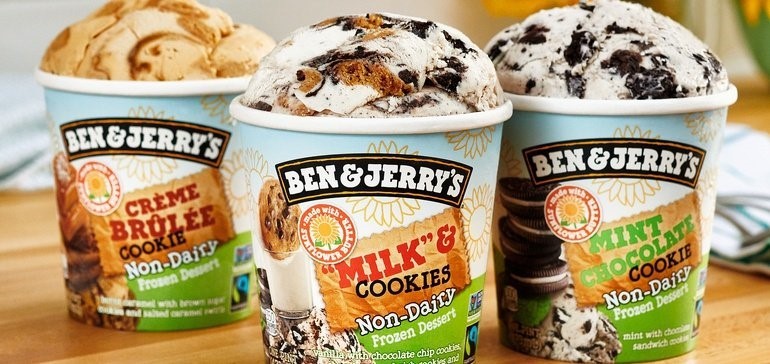Unilever sets $1.2B sales goal for plant-based products
AUTHOR
Nov. 18, 2020
Dive Brief:
Unilever set a sales target of 1 billion euros ($1.2 billion) from plant-based meat and dairy alternatives in the next five to seven years, the company announced.
The sales will come from both potential new offerings and plant-based versions of brands it already owns — including Hellmann’s, Ben & Jerry’s, Talenti and Magnum — plus a wider rollout of plant-based products from The Vegetarian Butcher, a Dutch company Unilever bought in 2018. Plant-based products currently make up a third of Unilever’s food and beverage portfolio, according to an email from Jostein Solheim, the company’s executive vice president of Foods and Refreshment for North America.
Unilever’s initiative also includes several nutrition and sustainability targets. It is the hallmark of the CPG ‘s Future Foods initiative, which aims to help consumers transition to healthier diets and reduce the food
As a leading company in the CPG space, Unilever is no stranger to sustainability and nutritional targets. It set its first goals along these lines 10 years ago. But the new targets are much steeper, requiring change to come much faster, and adding in the plant-based food target.
In addition to $1.2 billion in plant-based sales, Unilever’s new goals include cutting food waste from factory to shelf in half by 2025 — five years sooner than the company had previously committed to as part of the 10x20x30 initiative. Unilever also plans to double the number of products globally that have positive nutrition — defined as significant amounts of fruits, vegetables, proteins or micronutrients — by 2025.
By 2022, the company is pledging to substantially reduce salt, with 85% of products targeted to keep consumer intake at or below 5 grams daily. And in five years, the company vowed that 95% of its packaged ice cream will have no more than 22 grams of total sugar and 250 calories per serving.
“It’s not up to us to decide for people what they want to eat, but it is up to us to make healthier and plant-based options accessible to all,” Hanneke Faber, president of Unilever’s Foods & Refreshment Division, said in a written statement. “These are bold, stretching targets.”
Even though the plant-based space is quickly growing, the commitment shows Unilever agrees with other companies in the sector about sustainability issues associated with conventional agriculture.
“One billion people around the world are hungry and animal agriculture is
he second largest contributor to greenhouse gas emissions,” Solheim wrote in the email to Food Dive. “We urgently need to transition towards a food system that is more resilient and more sustainable. Our ambition is to make it easier for people to eat more plant-based foods that are good for us, good for the planet and, of course, delicious at the same time.”
Unilever has been able to roll out plant-based meat brand The Vegetarian Butcher in 30 European markets in just two years. It’s not clear if the brand’s vegan chicken, ground meat, fish and bacon substitutes will be making their way across the Atlantic. However, Unilever’s other brands in the United States can help the company hit its sales goal.
But the initiative is also being pushed by brands that don’t necessarily contain any animal-derived products. Knorr, a bouillon, broth and side dish brand, is promoting plant-based eating through its recipes and consumer support, Solheim wrote.
As for the health goals, Solheim wrote Unilever had already been working to reduce sodium and sugar and make other products more nutritious. The new commitment doesn’t really change what Unilever is working on, and does more to codify it so that consumers and other manufacturers can take notice.
While this initiative is being announced after nearly a year of the COVID-19 pandemic, it is not a response to it. The pandemic highlighted many of the reasons Unilever has made these commitments, Solheim wrote. The outbreak exposed the worldwide real dangers of food insecurity, as well as the need to strengthen food supply chains.
In an analyst’s note emailed to Food Dive, Global Data consumer analyst Ryan Whittaker noted meat substitutes are growing at a 8% clip globally and are worth an estimated $5.1 billion. The firm also found consumer attitudes are shifting and placing more of a premium on sustainability and ethics, which are reflected in Unilever’s initiative.
“Unilever could be said to be leading the way in how business is going to have to become greener, less wasteful and ultimately more sustainable,” Whittaker wrote. “Other companies should take note; their plans for the future should consider the use of plant-based alternatives to help redesign the global food system.” Unilever is not the first global food giant to come out and say plant-based eating is the future. Nestlé also has come to a similar conclusion. With its portfolio in the United States, Unilever is taking a similar approach to Nestlé by producing plant-based options of its top brands. The fact that no other companies have set the same type of sales goals for plant-based foods as Unilever gives the company more incentive to turn consumers to its plant-based options and shows the world it is serious about its commitment

